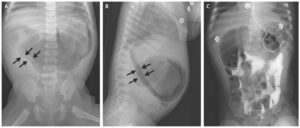This article is an answer to the Case – Anisocoria from Nebulized Medication
A 42-year-old intravenous drug user was transferred to the ward for noninvasive respiratory support after discharge from the intensive care unit, where she had been treated for fungal pneumonia and septicemia. She had alcoholic cirrhosis, chronic active hepatitis B, and hepatitis C. She had a test negative for the human immunodeficiency virus.
She received oxygen and nebulized albuterol (salbutamol) and ipratropium bromide through a face mask that was attached to a noninvasive bilevel positive-airway-pressure (BiPAP) ventilator. She was recovering well when her right pupil became fixed and dilated.
Examination of the cranial nerves showed no other abnormalities. A computed tomographic scan of her head, performed to search for an intracranial cause of partial palsy of the right third cranial nerve, was normal.
The BiPAP face mask was found to fit imperfectly and leak slightly to the right. The anisocoria resolved within 24 hours after the patient stopped receiving ipratropium.
If the conjunctiva is exposed to ipratropium (an anticholinergic agent) by means of metered-dose inhalers or nebulizers, mydriasis as well as acute glaucoma may occur.

